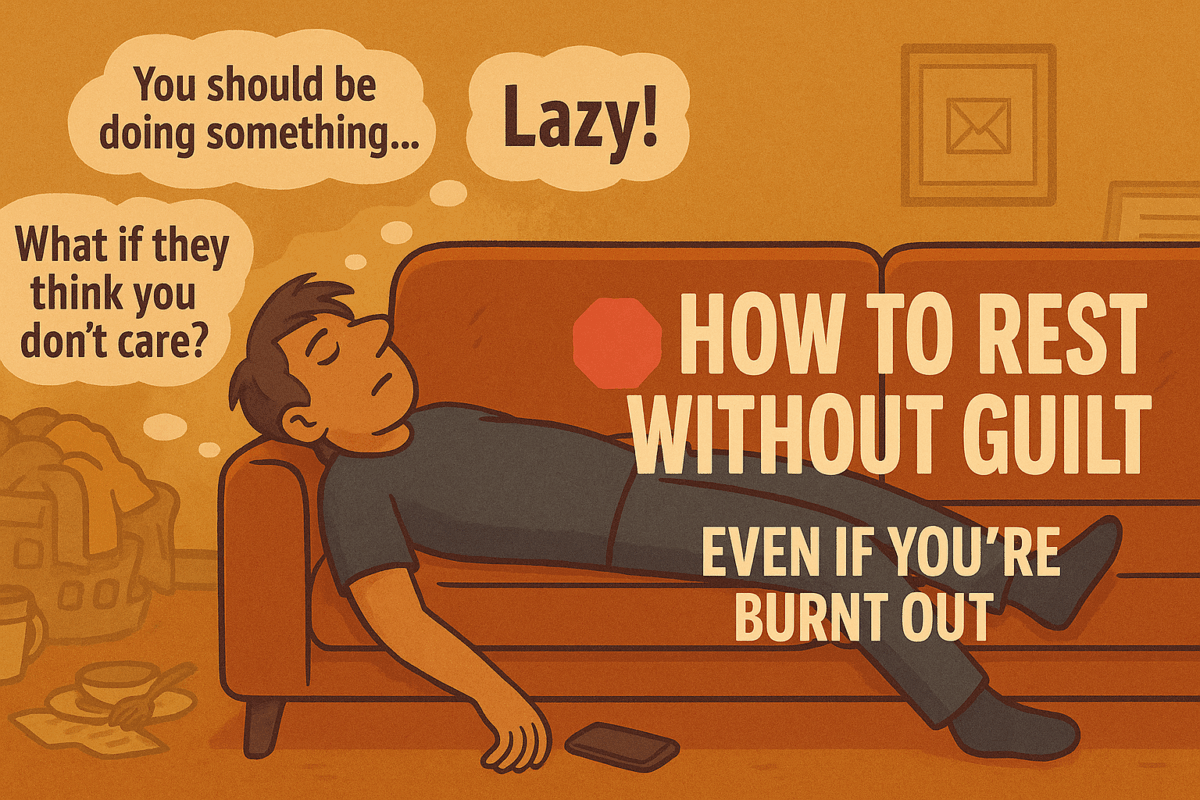
How to Rest Without Feeling Guilty (Even If You’re Cooked)
You cancel a plan and spend the next three hours apologising like you just kicked someone’s nan. You try to lie down, but your brain kicks off a motivational TED Talk called “Every Task You’ve Ever Avoided.” You attempt to chill, and somehow end up reorganising the pantry and emotionally supporting three group chats.
Sound familiar?
Welcome to burnout with a guilt garnish. Where rest feels illegal, and your nervous system is still checking emails even when you’re horizontal.
This one’s for the over-functioners, the emotionally fried, the people-pleasers in performance mode, and the ones who don’t know how to stop without spiralling.
TL;DR: How to Rest Without Guilt
-
Rest is a need, not a naughty indulgence
-
Guilt is just emotional spam, not a signal
-
You’re not lazy. You’re just maxed out
-
Stillness isn’t selfish. It’s survival
-
You don’t need to earn rest. You need to remember you’re human
Why Guilt Shows Up When You Rest
Somewhere along the way, you got the memo that stillness equals laziness. That value is measured in productivity. That worth comes from being constantly available, helpful, or halfway to burnout.
So when you pause, even for a breath, your brain hits the panic button:
-
“You should be folding something.”
-
“Someone else is being more productive.”
-
“What if people think you don’t care?”
Guilt thrives in the gap between what you need and what you’ve been told is allowed.
🚩 Signs You’re Afraid to Rest
-
You can’t nap unless you’ve earned it with suffering
-
You feel anxious if your to-do list isn’t done and colour-coded
-
You check emails on your day off “just in case”
-
You find it easier to do something for others than to sit with your own needs
-
Silence feels unsafe. Stillness? Downright suspicious
This is emotional burnout in productivity cosplay.
What Rest Actually Is
Rest isn’t flaking or giving up. It’s hitting pause before your brain starts staging a mutiny and your body sends you a passive-aggressive memo via back pain and random crying in the cereal aisle.
It looks like:
-
Letting your body recover from constant overdrive
-
Letting your brain exhale
-
Respecting your limits before they become red flags
-
Saying “Not today”, full stop
You’re not opting out. You’re tuning in.
How to Start Resting (Even When It Feels Illegal)
1. Start Small (and Sneaky)
Take five minutes. Just five. Stare out a window. Sit down without multitasking. Breathe. Don’t scroll. Don’t “just do a quick tidy.”
This is micro-rest. It still counts.
2. Name the Guilt When It Shows Up
“Ah, there you are, guilt. You’re not a fact. You’re a habit.”
You don’t need to wrestle with it. Just don’t hand it the keys.
3. Replace Guilt With Permission
Try saying (or shouting):
-
“I’m allowed to rest even if the dishes aren’t done.”
-
“Tired doesn’t mean weak.”
-
“Resting makes me better, not broken.”
Post it on a sticky note. Tattoo it on your forehead. Whatever works.
4. Pick Rest That Actually Rests You
Bubble baths are cute, but real rest might look like:
-
Saying “nope” to weekend plans
-
Lying flat on the floor with music
-
Napping like it’s your job
-
Drinking tea in silence and not fixing anything for once
Rest is whatever refuels you. Not what looks aesthetic on someone else’s Instagram.
What Happens When You Actually Let Yourself Rest
-
You get less snappy at everyone and everything
-
You stop resenting your group chats
-
You make decisions from calm instead of chaos
-
You remember you’re a human, not a system update
And maybe, just maybe… you start feeling like you again.
Still Carrying Everyone Else’s Ducks?
If you’ve forgotten how to rest without guilt, you’re probably not lazy, you’re cooked. The Strong One Is Tired is your sarcastic, soft permission slip to stop being the responsible one for five minutes and let yourself breathe.
It won’t give you a productivity plan. It’ll give you a break.
🛒 Grab The Strong One Is Tired – Your Guide to Burnout Recovery for Overfunctioners Who Can’t Sit Still
Grab The Strong One Is TiredYou’re Not Lazy, You’re Burnt Out (Here’s How to Tell the Difference)
Can’t function, but feel guilty for resting? This isn’t laziness. This is burnout. Learn how to tell the difference, and start recovering.
How to Rest Without Feeling Guilty (Even If You’re Cooked)
Tired but can’t switch off? This guide shows you how to rest without guilt, even if your brain insists you should be doing more.
Why Being the Helper Is Quietly Destroying You
Being the helper feels noble, until it leaves you emotionally empty. Here’s why being the strong one is exhausting you and how to take your energy back.
How to Set Emotional Boundaries Without Explaining Yourself
You don’t need to host a TED Talk every time you protect your peace. This guide teaches you how to say no without guilt, drop the over-explaining, and reclaim your damn energy. Because your nervous system deserves better.
Why Burnout Doesn’t Look Like Burnout Anymore
You’re still functioning, but you’re also fading. This article exposes the quiet truth about emotional burnout, how it’s changed, and what modern burnout really feels like.
10 Signs You’re the Strong One in Every Room (and It’s Wrecking You)
You’re the reliable one. The rock. The unpaid therapist. But constantly carrying everyone else’s chaos comes at a cost, and it’s probably already showing up in ways you’ve been taught to ignore. This one’s for the strong-but-cooked.







